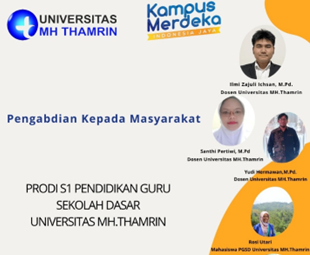Empowerment knowledge of elementary school teachers for supporting green schools
DOI:
https://doi.org/10.22219/jcse.v4i1.24522Keywords:
Attitude, Green Schools, Environment, Knowledge, TeachersAbstract
Environmental problems including in this case environmental pollution need to be overcome in various ways. Schools as educational institutions need to be examples and role models for the development of environmental-based schools or green schools. The problems that occurred in one of the schools, namely SDS Darul Amal Jampangkulon Sukabumi West Java showed that information related to green schools was still very minimal. The purpose of this activity is to overcome the problem of the low knowledge of elementary school teachers related to efforts to establish green schools. The implementation method used in this activity is through online seminars using a teleconference application. The results of this community service activity indicate that the knowledge score and teacher attitudes have increased related to green school. The average knowledge score at the beginning was 24.79 and increased to 32.62 and teacher attitudes increased from 82.92 to 86.67 for the topic of green school. Green school activities that can be applied in future activities are to familiarize students with being able to sort waste.
Downloads
References
Bissinger, K., & Bogner, F. X. (2018). Environmental literacy in practice: education on tropical rainforests and climate change. Environment, Development and Sustainability, 20(5), 2079–2094. https://doi.org/10.1007/s10668-017-9978-9
Cheng, I. N. Y., & So, W. W. M. (2015). Teachers’ environmental literacy and teaching - Stories of three Hong Kong primary school teachers. International Research in Geographical and Environmental Education, 24(1), 58–79. https://doi.org/10.1080/10382046.2014.967111
Gietz, C., & McIntosh, K. (2014). Relations Between Student Perceptions of Their School Environment and Academic Achievement. Canadian Journal of School Psychology, 29(3), 161–176. https://doi.org/10.1177/0829573514540415
Goldman, D., Yavetz, B., & Pe’er, S. (2014). Student teachers’ attainment of environmental literacy in relation to their disciplinary major during undergraduate studies. International Journal of Environmental and Science Education, 9(4), 369–383. https://doi.org/10.12973/ijese.2014.222a
Jonell, M., Crona, B., Brown, K., Rönnbäck, P., & Troell, M. (2016). Eco-labeled seafood: determinants for (blue) green consumption. Sustainability, 8(9), 1–19. https://doi.org/10.3390/su8090884
Kabadayi, A., & Altinsoy, F. (2019). Traditional and technological methods for raising pre-school children’s awareness of environmental pollution for sustainability. Discourse and Communication for Sustainable Education, 9(2), 134–144. https://doi.org/10.2478/dcse-2018-0020
Kaiser, F. G., & Wilson, M. (2004). Goal-directed conservation behavior: the specific composition of a general performance. Personality and Individual Differences, 36(7), 1531–1544. https://doi.org/10.1016/j.paid.2003.06.003
Lai, C. (2016). Integrating E-books into Science Teaching by Preservice Elementary School Teachers To cite this article : Integrating E-books into Science Teaching by Preservice Elementary School Teachers. Journal of Education in Science, Environment and Health, 2(1), 57–66.
McCullough, M. B., Martin, M. D., & Sajady, M. A. (2018). Implementing green walls in schools. Frontiers in Psychology, 9(JUN). https://doi.org/10.3389/fpsyg.2018.00619
Rahmayanti, H., Oktaviani, V., & Syani, Y. (2018). The implementation of smart trash as smart environment concept. E3S Web of Conferences, 74, 06003. https://doi.org/10.1051/e3sconf/20187406003
Robina-Ramírez, R., & Cotano-Olivera, C. (2020). Driving private schools to go “green”: The case of Spanish and Italian religious schools. Teaching Theology and Religion, 23(3), 175–188. https://doi.org/10.1111/teth.12547
Seebauer, S., Fleiß, J., & Schweighart, M. (2017). A Household Is Not a Person: Consistency of Pro-Environmental Behavior in Adult Couples and the Accuracy of Proxy-Reports. Environment and Behavior, 49(6), 603–637. https://doi.org/10.1177/0013916516663796
Shay-Margalit, B., & Rubin, O. D. (2017). Effect of the Israeli “Green Schools” Reform on Pupils’ Environmental Attitudes and Behavior. Society and Natural Resources, 30(1), 112–128. https://doi.org/10.1080/08941920.2016.1171939
Simbolon, B. R. (2010). Paket Materi Pembelajaran Inkuiri Dalam Pendidikan Lingkungan Hidup Untuk Meningkatkan Perilaku Berwawasan Lingkungan Siswa SD di Jakarta. Jurnal Ilmiah Pendidikan Lingkungan Dan Pembangunan, 11(2), 1–20. https://doi.org/10.21009/plpb.112.01
Sucipto, & Safitri, R. (2019). School infrastructure green environment. 353(1). https://doi.org/10.1088/1755-1315/353/1/012039
Truelove, H. B., & Gillis, A. J. (2018). Perception of pro-environmental behavior. Global Environmental Change, 49(February), 175–185. https://doi.org/10.1016/j.gloenvcha.2018.02.009
Voulvoulis, N., & Burgman, M. A. (2019). The contrasting roles of science and technology in environmental challenges. Critical Reviews in Environmental Science and Technology, 49(12), 1079–1106. https://doi.org/10.1080/10643389.2019.1565519
Wissinger, J. E., Knutson, C. M., & Javner, C. H. (2020). Designing Impactful Green and Sustainable Chemistry Workshops for High School Teachers. In O. S.O., M. C.H., & P. K.E. (Eds.), ACS Symposium Series (Vol. 1344, pp. 1–14). American Chemical Society. https://doi.org/10.1021/bk-2020-1344.ch001
Zhang, Z., Martin, K. L., Stevenson, K. T., & Yao, Y. (2022). Equally green? Understanding the distribution of urban green infrastructure across student demographics in four public school districts in North Carolina, USA. Urban Forestry and Urban Greening, 67. https://doi.org/10.1016/j.ufug.2021.127434
Zhao, J., Zheng, X., Dong, R., & Shao, G. (2013). The planning, construction, and management toward sustainable cities in China needs the Environmental Internet of Things. International Journal of Sustainable Development and World Ecology, 20(3), 195–198. https://doi.org/10.1080/13504509.2013.784882

Downloads
Published
How to Cite
Issue
Section
License
Copyright (c) 2023 Ilmi Zajuli Ichsan, Santhi Pertiwi, Yudi Hermawan

This work is licensed under a Creative Commons Attribution-ShareAlike 4.0 International License.












